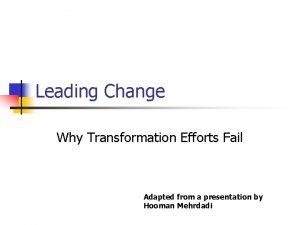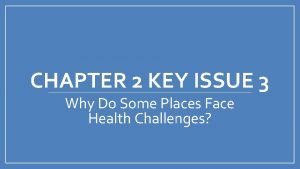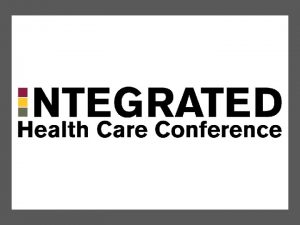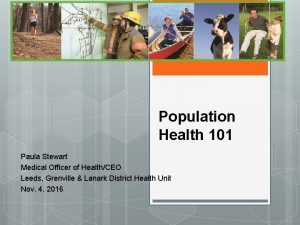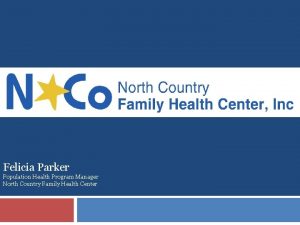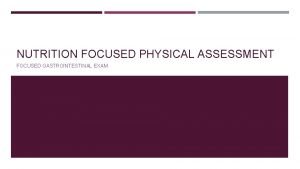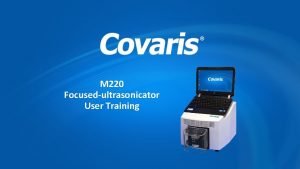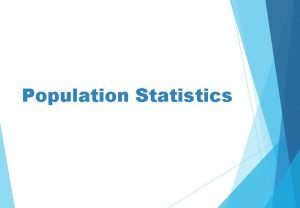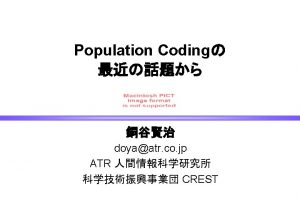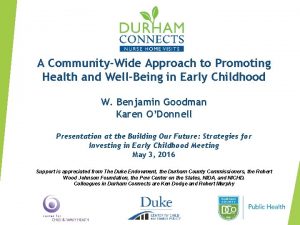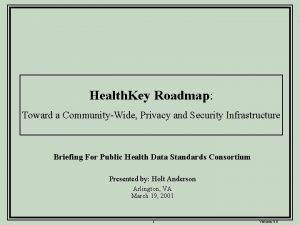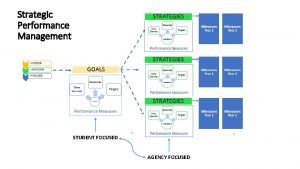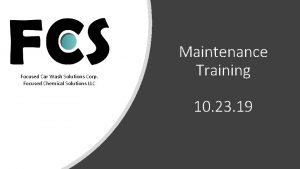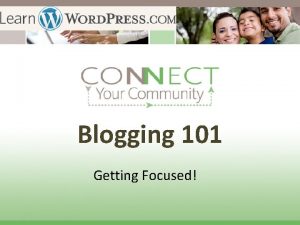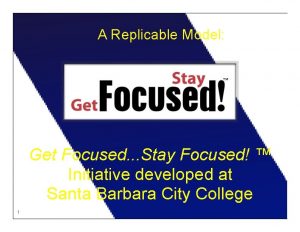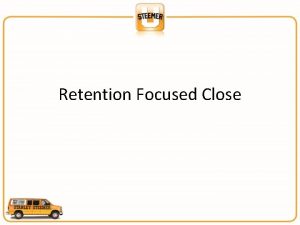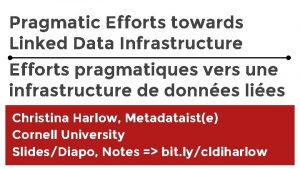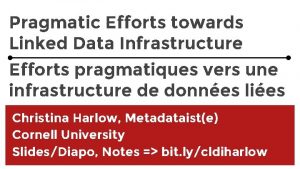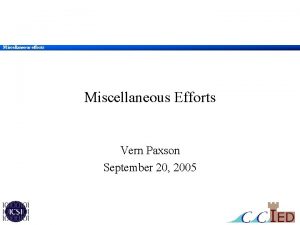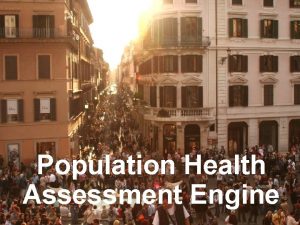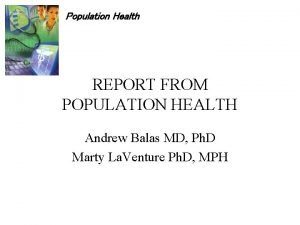Improving CommunityWide Population Health with Focused Efforts on


























- Slides: 26

Improving Community-Wide Population Health with Focused Efforts on Payment Reform WEDNESDAY, OCTOBER 18 3: 00 – 4: 00 PM EST

Improving Community-Wide Population Health with Focused Efforts on Payment Reform WEDNESDAY, OCTOBER 18 3: 00 – 4: 00 PM EST

Health Care Improvement Foundation Independent non-profit based in Philadelphia Neutral convener of hospital/ health system community in five-county Southeastern PA region and across PA Facilitator of collaborative improvement initiatives focused on patient safety, data transparency, and population health 3

4

Collaborative Opportunities to Advance Community Health (COACH) Collaboration across: 7 health systems representing 18 hospitals in Southeastern PA 16 community, public health, and insurer partners in the region Adopted “collaboratory” approach based on the following premises: Common goal to address a specific social determinant of health Fidelity to shared approach and tools, while also allowing for customization and variation at each institution Variation a source of shared learning Adoption of shared metrics to assess impact 5

6

Building Blocks of Trust • Neutral facilitator role • Transparency • Participant-driven process for decision-making • Coaching and outreach between meetings • Consistent reinforcement of shared values and challenges • Humor! • Interactive meetings that allow for genuine participant engagement 7

Curiosity About Patients & Their Contexts 8

Clinical-Community Linkages • Broadening the definition of care team to include social service agencies and community-based organizations who can help to address social needs • Through COACH, pursuing collective engagement of key stakeholders and referral partners to be on the other end of the warm handoff from healthcare provider • Possible models include proactive outreach to patients by partners via phone or co-locating partners on-site to work with patients 9

Planting Seeds Developing shared data systems Evaluating tools for aggregating data from pilots Exploring referral to community resources through health information exchange, enabling referral tracking Developing payment & financing models Potential to leverage Comprehensive Primary Care Plus (CPC+) payment model to develop model of payment for non-medical needs 10

Progress to Date • 3 out of 9 pilots up and running, majority by late November • Efficiency found in collective development of robust partnerships with and referral pathways to community resources • Creation of champions for addressing social determinants of health • Balance struck between fidelity to common elements (e. g. , screening tool, measurement) and flexibility that accommodates diverse institutional cultures and infrastructures • Establishment of environment for sharing lessons learned, enabling faster spread of best practices and innovations 11

Questions? Who Are We? Susan Choi, Ph. D, CPHQ schoi@hcifonline. org (215) 575 -3742 THANK YOU! 12

Alignment for Health Equity and Development (Getting AHEAD in Detroit) 13

The Public Health Institute created the Alignment for Health Equity and Development program in 2014 Impetus Expanded coverage and shift in financial incentives in health care Health care providers/payers increasingly at financial risk for poor health driven by SDH Emerging societal imperative to address fundamental inequities Growing awareness of potential for alignment of health and community development sectors Purpose Build shared ownership for health in neighborhoods where inequities are concentrated Explicit alignment of health sector services, programs, activities, and community development sector investments Core Themes Optimal leveraging of EXISTING resources – make better use of current dollars Support local infrastructure to manage, facilitate, evaluate, and sustain Slide courtesy of PHI 14

Criteria to Participate in AHEAD include… Shared Ownership • Ongoing engagement of diverse community stakeholders • Commitment to data sharing, alignment of programs, and shared metrics across institutions and sectors Strategic Targeting ID neighborhoods, census tracts, or zip codes with concentrated health, social, and economic inequities as the focus for shared investment Backbone Infrastructure Entities with expertise and objectivity to manage the process (e. g. , convening, facilitation, monitoring and evaluation, and intersectoral knowledge). Slide courtesy of PHI 15

16

AHEAD recognizes the imbalances in the current model where most $ go to clinical care 17

AHEAD looks to build a comprehensive health strategy that breaks the current high-cost, poor-health cycle by investing in community 18

Roles of the AHEAD coordinator include… 19

In late Spring 2015, GDAHC was invited by the PHI to lead the AHEAD project in Detroit; highlights of AHEAD in Detroit include. . . 20

A long-term initiative with funding from the Kresge Foundation, the Public Health Institute (PHI), in partnership with The Reinvestment Fund (TRF), and convened locally by GDAHC in Detroit’s Cody Rouge Neighborhood, AHEAD aims to: • Align the resources of health and community development stakeholders into balanced portfolios of investment; in comprehensive health improvement strategies with a shared measurement system; • Identified more than 30 organizations with alignment opportunities; • Focus resources in neighborhoods where health inequities are concentrated (Cody. Rouge); and • Build a field of practice that provides the tools, evidence, and models to support local scaling and replication across the country. • Convergence Workgroup selected diabetes and pre-diabetes. • Developing a DPP protocol. 21

A comprehensive array of community stakeholders participated in the Detroit Convergence Work Group 22

The Detroit AHEAD project identified a number of opportunities for improvement and expected to pilot their impact on diabetes. 23

Regardless of the power and potential of AHEAD, a number of challenges have somewhat “derailed” the project 24

Who Are We? 25

Join Health. Doers Open Community – Sign up is easy! 1. Community. healthdoers. org 2. Click “Log In /Sign Up” 3. Enter your email and create a password 4. Verify your email through your inbox 5. Set up your profile and access resources, conversation, and network! 26
 Section 1 population dynamics answer key
Section 1 population dynamics answer key Section 1 population dynamics answer key
Section 1 population dynamics answer key Population ecology section 1 population dynamics
Population ecology section 1 population dynamics Population ecology section 1 population dynamics answer key
Population ecology section 1 population dynamics answer key Kotter why transformation efforts fail
Kotter why transformation efforts fail Analysing consumer market
Analysing consumer market Anti-corruption efforts
Anti-corruption efforts To advertise noun
To advertise noun Repeated systematic efforts to inflict harm
Repeated systematic efforts to inflict harm What is economics
What is economics A(n) is a desired end toward which efforts are directed.
A(n) is a desired end toward which efforts are directed. Endangered species paragraph
Endangered species paragraph Lesson 3: europe in the muslim world
Lesson 3: europe in the muslim world Population health risk assessment and management
Population health risk assessment and management Chapter 2 population and health key issue 3
Chapter 2 population and health key issue 3 Population health
Population health Leeds grenville lanark population
Leeds grenville lanark population Population health program manager
Population health program manager Problem-focused coping examples
Problem-focused coping examples Upside down focused grid
Upside down focused grid Unfocused task example
Unfocused task example Process focus strategy
Process focus strategy Layout strategies examples
Layout strategies examples Nutrition assessment
Nutrition assessment Nutrition focused physical exam / examination
Nutrition focused physical exam / examination Problem-focused coping examples
Problem-focused coping examples Afa grade water
Afa grade water




